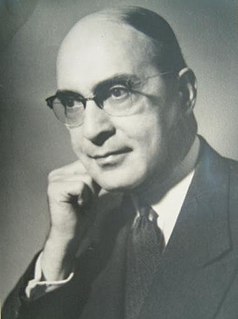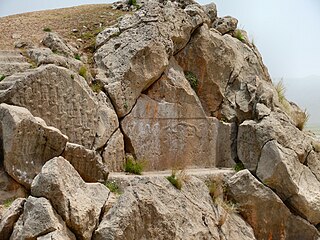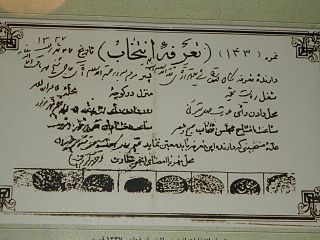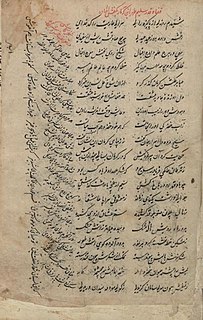
The Institute of Standards and Industrial Research of Iran is the Iranian governmental institution for standardization and certification. It is the Iranian representative to International Organization for Standardization.

Nasser Pourpirar, was a famous Iranian writer and historical revisionist. He was known for his controversial theories questioning the academically recognized historiography of Iran from Achaemenids to the beginning of the Safavid period.

Hossein Ghods-Nakhaï, was an Iranian poet, politician, cabinet minister, and diplomat.

Malekshahi County is a county in Ilam Province in Iran. The Malekshahi tribe is the biggest kurdish tribe in Ilam. The capital of the county is Arakvaz. It was separated from Mehran County in 2008. At the 2006 census, the county's population was 31,393, in 5,722 families. The county is subdivided into two districts: the Central District and Gachi District. The county has three cities: Arakvaz, Mehr and Delgosha.
Brayim Younisi was an Iranian Kurdish writer, novelist and translator.

Ahmad Khan Daryabeigi graduated from Dar ul-Funun school with degrees in engineering and military studies. His research in 1887 provided the landscape for official Iranian claims to its three island. During Naser al-Din Shah Qajar, he became the first Iranian captain of the Persepolis Battleship in Bushehr which recently Iran had purchased from Germany and designed the first Iranian Navy uniform and later became the Lord Admiral of the Persian Gulf. In 1893, about 22 years before the First World War, he became the Governor of Bushehr and Southern Ports and Ommanat. In March 1899, he conquered Port of Lingeh and returned it to Iran’s sovereignty.
Zurarah ibn A'yan was a famous companion of Imam Baqir, Imam Sadiq, and Imam Kazim. He was a Muhaddith and Islamic scholar with great knowledge in religion,and was also one of the companions known as the "companions of consensus" whose hadith are given extra credence by Shia scholars. Muhaddith Qummi in his book Tuhfah al-Ahbab said that "his excellence and status are too great to mention here".
Dr. Seyed Ali Mirlohi Falavarjani is an Iranian professor of Arabic literature, now retired from the University of Isfahan. He was born in 1942 in the city of Falavarjan, the province of Isfahan, Iran. He is the founder of the Islamic Azad University of Falavarjan, Isfahan, and was its president from 1985 to 1992. This branch of the university now has in excess of 4,000 students across more than 10 fields of study. It has a high number of female students.

Vartan Hovanessian was an Iranian Armenian architect and leading figure in architectural practice and philosophy.
Musa Khamis was an Iranian general in the war between Qajar Empire and the Ottoman Empire in 1821.

Southern Lurs are a large part of Lurish people who natively speak Southern Lurish language a branch of Western Iranian languages, and are an Iranian people. They occupy some regions in Southwest of Iran including Kohgiluyeh and Boyer-Ahmad (fully), Sotheastern parts of Khuzestan Northwestern parts of Fars, and Western parts of Bushehr Province.
Musa Najafi is an Iranian professor, historian and author. He is the director of the Department of Political Thought and Philosophy at Islamic Azad University and directs the PhD group in political science at Imam Khomeini Educational Research Institute, with a focus on the issues of Iran. Najafi also heads the Research Institute of Culture and Islamic Civilization and Revolution, where he is head of the Department of Islamic Revolution Theory. Najafi is a former faculty member of the Department of the Political Science at Tehran University.
Ali Abolhassani, known as Monzer (1955-2012) was an Iranian spiritual contemporary historiograph. Five-volume set book of "constitutional and Sheikh Fazlullah Nuri" including his books. Two books of "stability until the gallows" and "an analysis of the triple role of martyr Sheikh Nuri in tobacco boycott movement" is also of the other his works about Sheikh Fazlullah Nuri. His books use as reference in books written by scholars on Islam and history of Iran.
Maghsoud Farasatkhah is an Iranian sociologist who was born in Tabriz.He is a Professor at Institute for Research and Planning in Higher Education.

This list includes the biological mothers of Qajar Shahs. There were seven shahs (kings) of the Qajar Empire in 6 generations. Throughout the 130-year history of the Qajar Dynasty the shahs were all members of the same house, the house of Qajar.

Mehrdad Pahlbod was an Iranian royal and politician who served as the first culture minister of Persia from 1964 until the 1978.
Mohammed Ali Sardar Afkham was the ruler of Gilan and the son of Mohammad Khan Tabib al-Dawlah, who arrested the constitutionalists in Gilan and Rasht between 1907 and 1909. He was one of the fiercest opponents of Constitutionalization in Iran. Sardar Afkham was killed by the constitutionalists during the Battle of Rasht.

Isfahan National Holy Association was the main political and decision-making bureau of Isfahan, Iran during the first Persian Constitutional Revolution period. The members of the council were elected by the people of Isfahan and Nurollah Najafi Isfahani chaired the council. The association was formed between years 1906 and 1908, namely from the migration of Qom to the 1908 bombardment of the Majlis at the Fort of Chehel Sotoun in Isfahan.

Mohammad Reza Tarshati Tehrani, nicknamed Salim was an Iranian poet and one of the Persian-speaking poets of the Mughal Empire.









